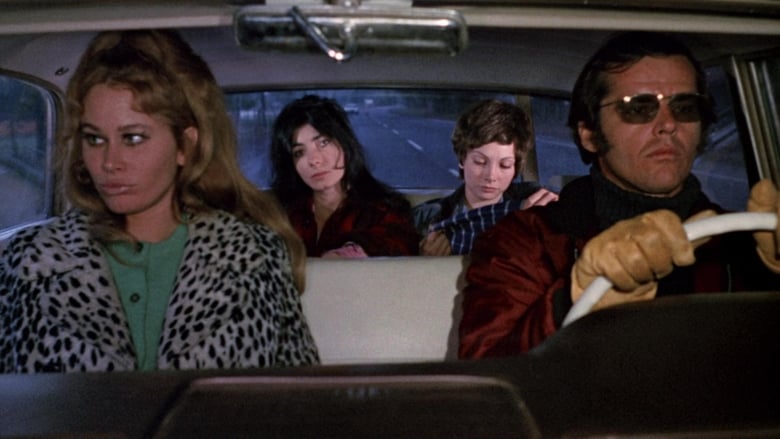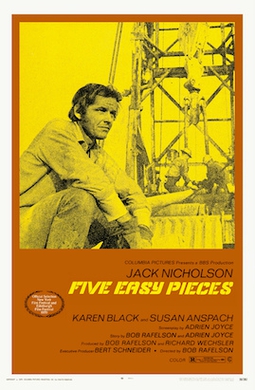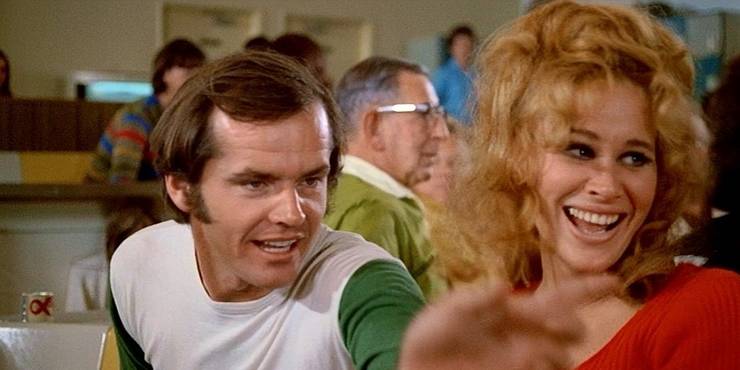← Back to Reviews

in
Five Easy Pieces
An explosive, raw nerve of a performance by the iconic Jack Nicholson anchors 1970's Five Easy Pieces, an off-beat and often humorous character study that poses a few more questions about the central character than it answers, but never fails to rivet the viewer to the screen.

Nicholson plays Bobby Dupea, a hard-drinking, womanizing, loose cannon who works on an oil rig and is feeling somewhat trapped in his relationship with a sweet and slightly ditzy waitress named Rayell. Bobby learns that his father has taken ill and reluctantly takes a road trip, accompanied by Rayell, to see his father, a trip where bits and pieces of Bobby's past come into focus, offering some insight into the man he is.

Bob Rafelson, who also collaborated with Nicholson on Head, The King of Marvin Gardens, and the '81 remake of The Postman Always Rings Twice, directed and co-wrote this scenic postcard character study that actual tells two different stories. The first story introduces us to this rebel without a cause Bobby who lives by the seat of his pants and with complete lack of filter. The second half of the film offers insight into what made the man we met in the first half of the film who he is.

We don't really understand a scene early on in the film where Bobby jumps on a truck on a crowded highway, finds a piano on the truck and starts playing. However, it is revealed later that Bobby was once a promising concert pianist and gave it up. His trip back home reveals some of the circumstances that may have led to the end of Bobby's musical career, but it is never really spelled out, leaving a lot of what happened to the viewer's imagination, which I suspect was not an accident.

This film did carve itself a niche in cinema history for one classic scene in which Bobby is in a diner having difficulty ordering an omelet and a side of wheat toast, but there is so much more to offer here as Nicholson gets to play the gamut of emotions here and nails them all. Watch the scene where he tries to keep his best friend (Billy Green Bush) from being arrested or his final conversation with his father, who is unable to speak. This scene definitely left a lump in my throat.

Nicholson's tour-de-force performance is a winning combination of humor and intensity that earned him the second of his career twelve Oscar nominations, his first for Outstanding Lead Actor. Karen Black earned the only Oscar nomination of her career as the vulnerable and broken Rayell. Also loved Susan Anspach as Bobby's sister-in-law and Helena Kallianiotes as a butch hitchhiker. There's even a brief appearance from All in the Family's Sally Struthers in an eye-opening performance. The film also features superb cinematography from the legendary Lazlo Kovacs and music that is an initially unsettling combination of classic piano music and Tammy Wynette songs. And the final scene offered a shocking twist that this reviewer didn't see coming and bumped up the rating. A 50 year old classic that still delivers the goods.
An explosive, raw nerve of a performance by the iconic Jack Nicholson anchors 1970's Five Easy Pieces, an off-beat and often humorous character study that poses a few more questions about the central character than it answers, but never fails to rivet the viewer to the screen.

Nicholson plays Bobby Dupea, a hard-drinking, womanizing, loose cannon who works on an oil rig and is feeling somewhat trapped in his relationship with a sweet and slightly ditzy waitress named Rayell. Bobby learns that his father has taken ill and reluctantly takes a road trip, accompanied by Rayell, to see his father, a trip where bits and pieces of Bobby's past come into focus, offering some insight into the man he is.

Bob Rafelson, who also collaborated with Nicholson on Head, The King of Marvin Gardens, and the '81 remake of The Postman Always Rings Twice, directed and co-wrote this scenic postcard character study that actual tells two different stories. The first story introduces us to this rebel without a cause Bobby who lives by the seat of his pants and with complete lack of filter. The second half of the film offers insight into what made the man we met in the first half of the film who he is.

We don't really understand a scene early on in the film where Bobby jumps on a truck on a crowded highway, finds a piano on the truck and starts playing. However, it is revealed later that Bobby was once a promising concert pianist and gave it up. His trip back home reveals some of the circumstances that may have led to the end of Bobby's musical career, but it is never really spelled out, leaving a lot of what happened to the viewer's imagination, which I suspect was not an accident.

This film did carve itself a niche in cinema history for one classic scene in which Bobby is in a diner having difficulty ordering an omelet and a side of wheat toast, but there is so much more to offer here as Nicholson gets to play the gamut of emotions here and nails them all. Watch the scene where he tries to keep his best friend (Billy Green Bush) from being arrested or his final conversation with his father, who is unable to speak. This scene definitely left a lump in my throat.

Nicholson's tour-de-force performance is a winning combination of humor and intensity that earned him the second of his career twelve Oscar nominations, his first for Outstanding Lead Actor. Karen Black earned the only Oscar nomination of her career as the vulnerable and broken Rayell. Also loved Susan Anspach as Bobby's sister-in-law and Helena Kallianiotes as a butch hitchhiker. There's even a brief appearance from All in the Family's Sally Struthers in an eye-opening performance. The film also features superb cinematography from the legendary Lazlo Kovacs and music that is an initially unsettling combination of classic piano music and Tammy Wynette songs. And the final scene offered a shocking twist that this reviewer didn't see coming and bumped up the rating. A 50 year old classic that still delivers the goods.
